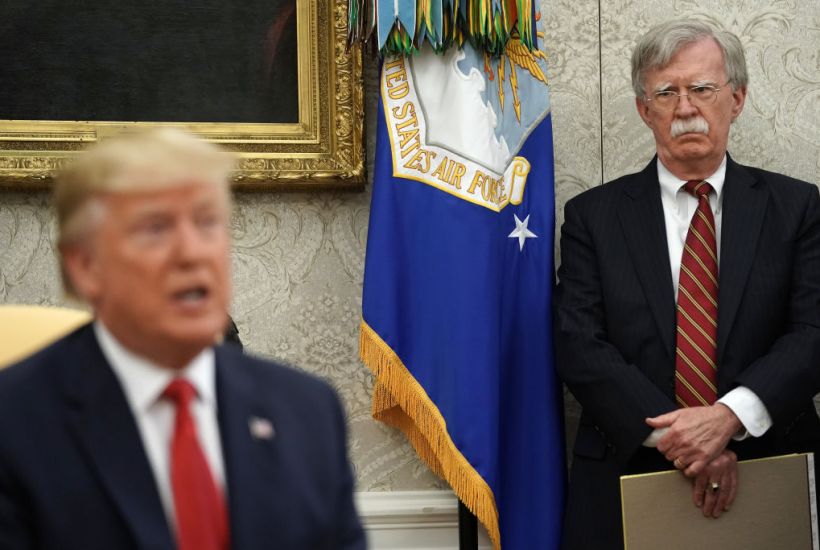Now that America is offering a trade deal – or as John Boulton says, a series of mini deals – can the Brexiteers handle it? And ought the internationalist Remainers to welcome it? The topic tends to send leading figures from both sides into a spin, raising questions as to how prepared they are for what might follow.
Many of those who are keenest to assert the importance of free trade with the EU tend to retreat in fright whenever the prospect of a trade deal with the US is raised. Exit the single market, they tell us, and Britain will face a shrinking economy, along with shortages of food and medicine. Negotiate a trade deal with the US, on the other hand, and we face the NHS being destroyed, as well as the population being forced to eat genetically modified food and chlorine-washed chicken. Brexiteers, meanwhile, are sanguine about tariffs on EU trade, while talking as if tariff-free American trade would be transformative.
The only way to square these two contrary positions is through the highly partisan politics of Brexit. Free trade with the US is opposed by some Remainers for no better reason than because it is advocated by Leavers. The advantages of free trade with our closest neighbours are being dismissed by Brexiteers because Remainers want them. On such a foolish basis is the future of Britain’s trading relations with the rest of the world being debated.
The reality is that free trade is almost always on balance a good thing, regardless of which country it is conducted with. That said, there will always be compromises to be made. Vested interests have to be tackled. Product standards have to be reviewed, and domestic producers must be exposed to external competition. It is no use trying to resist this, because it will inevitably result in the other side also refusing to make concessions. Good trade deals can even destroy native industries — but the overall effect of global trade is to boost the creation of wealth. Competitive industries expand into new markets, while uncompetitive ones are driven out by cheaper products from overseas.
The important thing is to make the right concessions. Quite rightly, the government has ruled out dismantling the NHS. Healthcare in Britain needs reform, but it shouldn’t be linked to trade policy. Nevertheless, the NHS has always outsourced some of its services — which last year accounted for 7 per cent of its budget. Why on earth should US providers not be allowed to compete for this work on equal terms with British companies? What is there to lose, for the NHS or for patients, by ensuring that when NHS hospitals are unable to provide a service, the widest possible range of alternatives can be offered?
As for GM crops, they have been the subject of far greater scaremongering than EU directives about bananas and so forth. Some of those trying to spread misinformation about GM foods may be unaware that we have already been eating them for years. GM soya, maize and sugar beet are allowed to be imported to the EU because so much comes from North America that it proved impractical to exclude them. No one can point to ill-effects, and for good reason: GM foods are subject to far more scrutiny than non-GM foods. Twenty years ago, Britain was on the cusp of being a leader in GM technology, but the industry was snuffed out by the EU’s precautionary — or perhaps more accurately protectionist — principle. Dismantling the barriers against GM should be one of the advantages of leaving the EU.
Then there is the practice of washing chicken in chlorine, which has been continuously cited as a reason why we shouldn’t do a trade deal with the US. Even the EU, when it banned chlorine-washed chicken in 1997, came to the conclusion that the practice was perfectly acceptable from a food-safety point of view — but banned it anyway on the flimsy pretext that it might provide farmers with a false sense of security. A better explanation is that it spied the opportunity to snuff out US competition for less efficient European producers. The issue of chlorine–washing ought to be examined through investigating the evidence, rather than dismissed (as it was by the Brexit-championing Michael Gove, seemingly on the grounds of spurious claims made by activists).
With the Trump administration engaged in a trade war with China, and with the EU refusing to discuss a trade deal with Britain without also attempting to control our regulation via the Irish backstop, the curtains on global trade are being drawn in the wrong direction — reversing decades of progress. A trade deal with the US — as well as ones with Australia, South Korea and many other countries that are keen to do business with us — would send a signal that globalisation of trade is far from over.
But it isn’t going to happen unless we are prepared to open our markets. Allow policy to be directed by protectionists’ myths, and we will be turning our backs on a huge opportunity to increase wealth. That really would be a self-inflicted wound.
It is natural to ask: what’s the catch? What does America want in exchange for free trade? The truth is that both sides benefit: that’s the whole point of trade. Perhaps one side benefits more than others, in certain sectors, but it’s a question of benefit. This is why the EU is deeply foolish to demand oversight over British laws in exchange for trade: the publish is no longer prepared to accept those terms, a point that voters made in the referendum result. As this magazine has argued since its inception, free trade is its own reward – for both sides.
John Bolton has come to London offering the hand of American friendship – and trade. If Britain is to become the open country that both Brexiteers and Remainers say they want them it makes sense to accept.
Got something to add? Join the discussion and comment below.
Get 10 issues for just $10
Subscribe to The Spectator Australia today for the next 10 magazine issues, plus full online access, for just $10.




















Comments
Don't miss out
Join the conversation with other Spectator Australia readers. Subscribe to leave a comment.
SUBSCRIBEAlready a subscriber? Log in